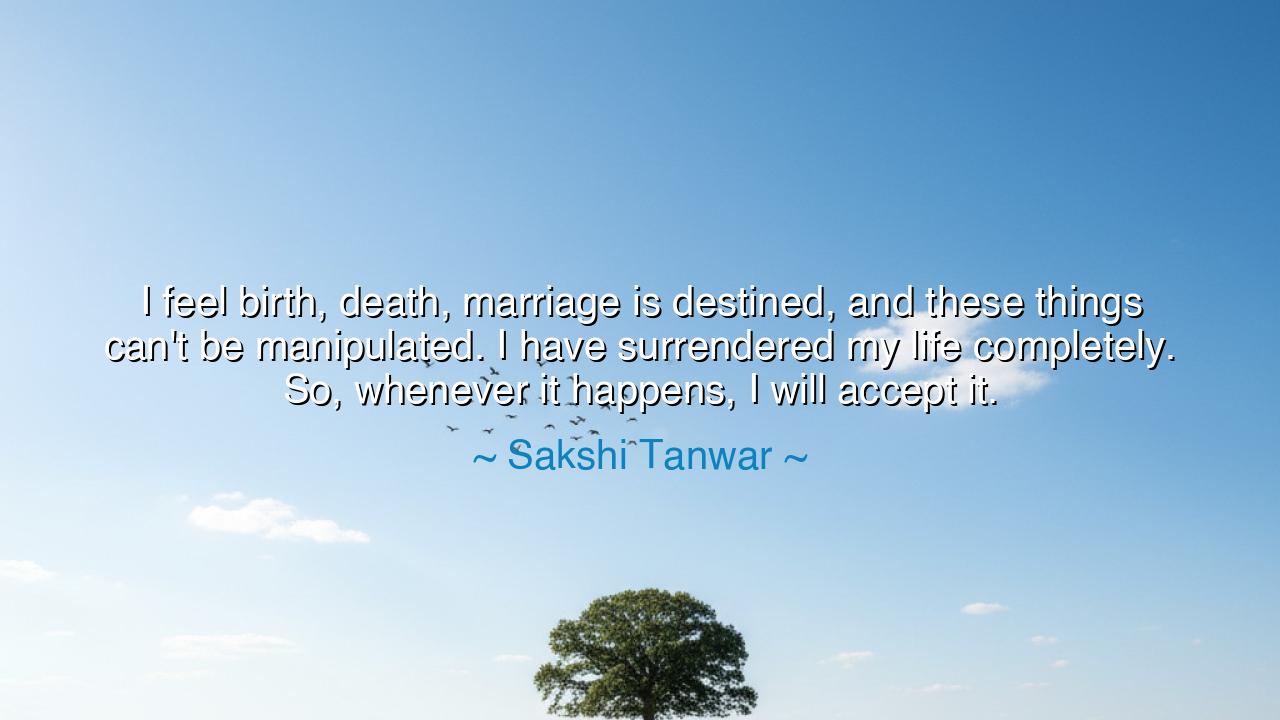
I feel birth, death, marriage is destined, and these things can't
I feel birth, death, marriage is destined, and these things can't be manipulated. I have surrendered my life completely. So, whenever it happens, I will accept it.






In the words of Sakshi Tanwar, there breathes the quiet strength of ancient faith: “I feel birth, death, marriage is destined, and these things can’t be manipulated. I have surrendered my life completely. So, whenever it happens, I will accept it.” In these few words lies the timeless wisdom of acceptance, the humility of one who has looked upon the vast tapestry of existence and realized that not every thread is meant to be held by human hands. Her voice echoes not resignation, but surrender—a sacred yielding to the rhythm of the universe, as old as creation itself.
From the dawn of time, mankind has struggled between the desire to control and the call to trust. Kings and peasants alike have prayed, plotted, and fought to shape destiny according to their will. Yet, the ancients taught that there are moments woven by divine design—birth, which brings us forth from the unseen; marriage, which binds souls in shared purpose; and death, which returns us to the eternal. These three, said the wise, are not ours to command. They are ordained by forces greater than desire, by the unseen hand of fate that guides every living being upon its path.
Consider the story of Siddhartha Gautama, who became the Buddha. Born a prince surrounded by luxury, his father sought to shield him from suffering, to manipulate fate so that he would never see sorrow. But destiny cannot be chained. When Siddhartha beheld old age, sickness, and death, his soul awoke to a truth beyond royal design. He left his palace and wandered into the wilderness, not to conquer life, but to understand it. In his surrender came enlightenment. He discovered that peace lies not in mastery over the world, but in the stillness of acceptance—in letting the river of existence flow as it will.
Sakshi Tanwar’s words carry this same ancient spirit. In a world that rushes to plan every hour, to chase every outcome, she reminds us that there are moments beyond our command. Birth arrives unbidden; love comes when it must; death approaches on its own time. To surrender, as she has, is not weakness—it is trust in the divine order. It is to stand before the mystery of life with open hands and say, “I will receive whatever comes.” Such faith is not born of ignorance, but of understanding that all control is illusion, and all timing sacred.
In surrender, there is profound freedom. Those who cling to control live in anxiety, forever wrestling with what they cannot change. But those who release their grip discover serenity. The farmer cannot command the rain, but he can till the soil with patience and await the season’s gift. So too must we act with sincerity and leave the outcome to fate. When we align our hearts with acceptance, even delay becomes divine, and disappointment turns to wisdom.
There is a beauty in timing, though we seldom see it while we wait. The flower does not bloom because it wills itself to; it blooms because the sun, the wind, and the season decree it so. Likewise, love, success, and even endings arrive when our souls are ready, not when our minds demand them. To surrender is to trust that the universe has not forgotten us. It is to believe that every joy and sorrow carries its appointed hour, and that in the end, all things unfold in harmony with the greater plan.
So, my child of tomorrow, heed this lesson: Live with faith, not fear. Do your part with courage, but do not force the heavens. When life delays your blessings, do not curse the silence—prepare yourself for what is yet to come. When love seems distant, do not chase—become worthy of its arrival. And when loss visits your door, bow your head and remember that nothing truly ends, for every death is but a return to the source.
Thus, as Sakshi Tanwar teaches, let your life be an act of sacred surrender. Trust the weave of destiny, and when your appointed moments come—birth, union, or departure—meet them with grace. For in acceptance lies peace, and in peace lies the eternal rhythm of the soul’s true home.






AAdministratorAdministrator
Welcome, honored guests. Please leave a comment, we will respond soon